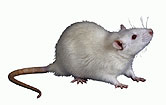
THURSDAY, March 10 (HealthDay News) — You may have a higher long-term risk of disease if your mother ate poorly during pregnancy, a new study in rats suggests.
U.K. researchers found that rats were more vulnerable to the effects of aging if their mothers were malnourished while they were pregnant. The study was published online this week in the Proceedings of the National Academy of Sciences.
In the study, a rodent mother’s diet appeared to affect her offspring’s expression later in life of a gene called Hnf4a, which plays a major role in the development of the pancreas and later in the production of insulin. Mothers with poor diets had offspring who expressed less of the Hnf4a gene, something that appeared to increase their risk of type 2 diabetes, a significant contributing factor to both heart disease and cancer.
“What is most exciting about these findings is that we are now starting to really understand how nutrition during the first nine months of life spent in the womb shape our long-term health by influencing how the cells in our body age,” senior study author Dr. Susan Ozanne, from the Institute of Metabolic Science at the University of Cambridge, said in a university news release.
Senior co-author Miguel Constancia, also of the University of Cambridge, echoed this sentiment in the release. “It is remarkable that maternal diet can mark our genes so they remember events in very early life,” he said.
“We already know that a healthy pregnancy is important in shaping a child’s health, and their risk of heart disease as they grow up,” Jeremy Pearson, associate medical director at the British Heart Foundation, said in the news release.
“The reasons why are not well understood, but this study in rats adds to the evidence that a mother’s diet may sometimes alter the control of certain genes in her unborn child. It’s no reason for expectant mothers to be unduly worried. This research doesn’t change our advice that pregnant women should try to eat a healthy, balanced diet,” Pearson added.
The British Heart Foundation helped fund the study.
More information
The American Congress of Obstetricians and Gynecologists has more about nutrition during pregnancy.

